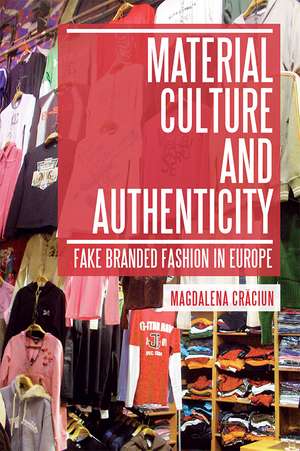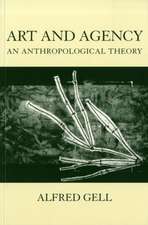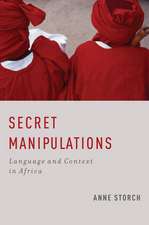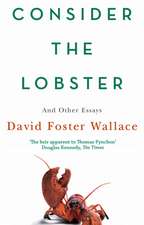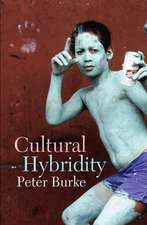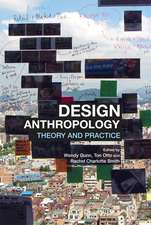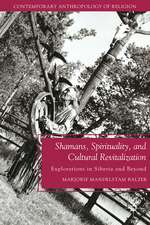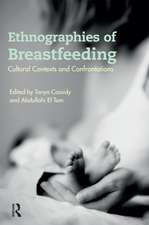Material Culture and Authenticity: Fake Branded Fashion in Europe: Materializing Culture
Autor Magdalena Craciunen Limba Engleză Paperback – 7 noi 2013
| Toate formatele și edițiile | Preț | Express |
|---|---|---|
| Paperback (1) | 364.51 lei 6-8 săpt. | |
| Bloomsbury Publishing – 7 noi 2013 | 364.51 lei 6-8 săpt. | |
| Hardback (1) | 998.68 lei 6-8 săpt. | +122.12 lei 6-12 zile |
| Taylor & Francis – 7 noi 2013 | 998.68 lei 6-8 săpt. | +122.12 lei 6-12 zile |
Din seria Materializing Culture
-
 Preț: 280.55 lei
Preț: 280.55 lei - 9%
 Preț: 935.79 lei
Preț: 935.79 lei -
 Preț: 233.55 lei
Preț: 233.55 lei - 14%
 Preț: 185.02 lei
Preț: 185.02 lei -
 Preț: 339.93 lei
Preț: 339.93 lei -
 Preț: 350.53 lei
Preț: 350.53 lei - 18%
 Preț: 1002.60 lei
Preț: 1002.60 lei - 13%
 Preț: 230.03 lei
Preț: 230.03 lei -
 Preț: 349.80 lei
Preț: 349.80 lei - 18%
 Preț: 999.34 lei
Preț: 999.34 lei -
 Preț: 350.95 lei
Preț: 350.95 lei -
 Preț: 268.65 lei
Preț: 268.65 lei -
 Preț: 233.37 lei
Preț: 233.37 lei -
 Preț: 275.90 lei
Preț: 275.90 lei - 14%
 Preț: 191.04 lei
Preț: 191.04 lei -
 Preț: 231.89 lei
Preț: 231.89 lei -
 Preț: 191.67 lei
Preț: 191.67 lei -
 Preț: 349.80 lei
Preț: 349.80 lei - 26%
 Preț: 570.43 lei
Preț: 570.43 lei - 18%
 Preț: 906.92 lei
Preț: 906.92 lei - 18%
 Preț: 997.11 lei
Preț: 997.11 lei - 11%
 Preț: 216.70 lei
Preț: 216.70 lei -
 Preț: 349.80 lei
Preț: 349.80 lei -
 Preț: 348.87 lei
Preț: 348.87 lei - 14%
 Preț: 183.16 lei
Preț: 183.16 lei -
 Preț: 231.42 lei
Preț: 231.42 lei - 13%
 Preț: 232.07 lei
Preț: 232.07 lei - 18%
 Preț: 999.51 lei
Preț: 999.51 lei - 18%
 Preț: 1008.17 lei
Preț: 1008.17 lei -
 Preț: 231.99 lei
Preț: 231.99 lei
Preț: 364.51 lei
Nou
Puncte Express: 547
Preț estimativ în valută:
69.75€ • 73.03$ • 57.85£
69.75€ • 73.03$ • 57.85£
Carte tipărită la comandă
Livrare economică 10-24 aprilie
Preluare comenzi: 021 569.72.76
Specificații
ISBN-13: 9780857854513
ISBN-10: 0857854518
Pagini: 176
Ilustrații: 6 bw illus
Dimensiuni: 156 x 234 x 15 mm
Greutate: 0.33 kg
Ediția:New.
Editura: Bloomsbury Publishing
Colecția Routledge
Seria Materializing Culture
Locul publicării:Oxford, United Kingdom
ISBN-10: 0857854518
Pagini: 176
Ilustrații: 6 bw illus
Dimensiuni: 156 x 234 x 15 mm
Greutate: 0.33 kg
Ediția:New.
Editura: Bloomsbury Publishing
Colecția Routledge
Seria Materializing Culture
Locul publicării:Oxford, United Kingdom
Cuprins
IntroductionInauthentic ObjectsThe Elusive Nature of Inauthenticity: Manufacture and Trade in Fake Branded Garments in TurkeyThe Elusive Nature of Inauthenticity: Trade and Consumption of Fake Branded Inauthentic Objects, Authentic SelvesConclusionBibliographyIndex
Notă biografică
Magdalena Craciun is Research Fellow, University of Pardubice, the Czech Republic.
Recenzii
"Craciun’s research provides an evocative account of how people struggle to negotiate authenticity in a world of inauthentic objects, namely fake branded goods. Through a nuanced and engaging ethnography, the book makes an extremely important contribution to the literature on authenticity and material culture. It will be essential reading for those interested in the experience of authenticity and it’s role in mediating personal relationships and identities. - Sian Jones, Professor of Archaeology, University of Manchester, UKIn this rich ethnography of the markets and small textiles manufacturers of Turkey and Rumania, Craciun constructs an alternative theory of brands, arguing that the materiality of branded goods - their shininess, smoothness; their pattern, cut, trimming and bobbling - are more important than the brand itself. A must read for anyone interested in thinking critically about the contemporary theorization of brands, authenticity, consumption, and materiality. - Haidy Geismar, Anthropology and Museum Studies, New York University & Department of Anthropology, University College LondonMagdalena Craciun’s Material Culture and Authenticity: Fake Branded Fashion in Europe makes for entertaining and meaningful reading … a valuable addition to the field of material culture and a welcome contribution to Romanian studies. Drawing on nine months of fieldwork in Istanbul, Bucharest, and a small provincial town in southern Romania, Craciun has published one of the few genuinely multi-sited ethnographies of Romania. Highly informative, ethnographically sensitive, and theoretically sophisticated, this book is indispensable reading for the emerging anthropology in and of Romania. - H-Net - Narcis Tulbure"
Descriere
The study of material culture demonstrates that objects make people just as much as people make, exchange and consume objects.
